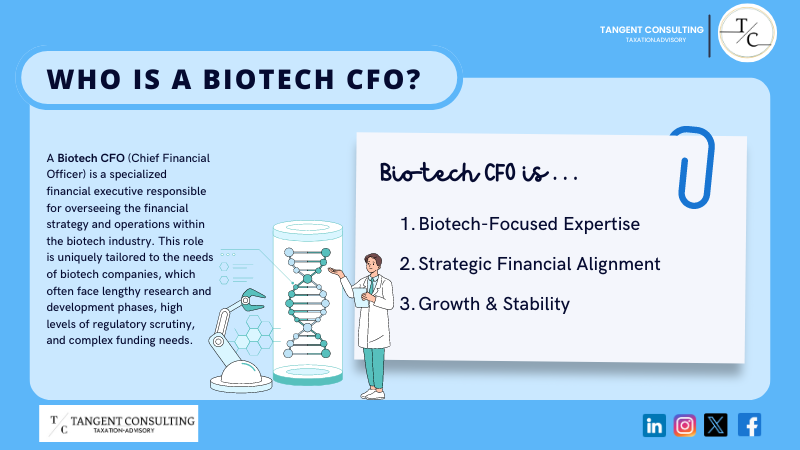How a Biotech CFO Turns Research into Revenue?
How a Biotech CFO Turns Research into Revenue?

In 2018, Moderna made headlines by raising $600 million in an initial public offering (IPO). It was a bold move for a company that had yet to bring a product to market. The question on Wall Street was: How would they turn all this groundbreaking research and development into revenue?
For any biotech company, turning research into revenue requires a comprehensive strategy. That’s when a biotech CFO can help. They ensure research breakthroughs translate into solid revenue.
In this guide, we’ll break down how a CFO can help a biotech company.

The Role of a Biotech CFO
The global biotech industry is expected to grow by $3.4 trillion by 2030. Biotech companies pour millions into clinical trials and experimental drugs. However, there’s no guarantee of success.
CFOs bring certainty to the table, take a deeper look into the company’s current financial position, and work on generating revenue. Let’s see how a CFO can help a biotech company:
Strategic Planning
As we mentioned in the previous section, a biotechnology firm can easily spend billions on its annual research and development. Here is where the CFO brings the R&D investment in line with the business’s goals.
Using precise financial modeling and forecasting, a CFO can assess the viability of long-term projects and determine how best to optimize funding, be it from investors or strategic partnerships.
We’ll talk more about investor capital in a while.

Navigating Clinical Trials
Clinical trials are very time-consuming and pricey. In phase 3 drug trials, the cost is around $20 million, and yet a huge probability exists that the drug will never reach its destination-that is, to the marketplace.
A CFO collaborates with management teams to decide the risk-reward ratio. A Biotech CFO analyzes trial costs, potential revenues, and positioning by competitors to decide which trials to push forward and which to re-consider.

Raising Investments
The very fact of persuading investors to support a biotech company is no small task. What is required as an aspect of the Biotech CFO’s role is making the company attractive to investors. Essentially, this involves translating scientific advancement into well-defined financial projections.
For instance, having experience with a public company helps biotech firms consider getting listed through an IPO. A Biotech CFO can use public company experience to demonstrate financial strength, growth potential, and strategic outlook to investors and board members.
A record $6.3 billion was raised in 2020 by biotech companies through an IPO, which points to investor interest in the sector.
However, any biotech company striving for the longer term will require a diversified funding strategy. Venture capital funding is common but not always sustainable.
Biotech CFOs often find funding from many sources like strategic partnerships, government grants, and licensing to major pharmaceutical firms. For example, many biotechnology companies are funded by the NIH and BARDA.

Managing Cashflow
It is not uncommon for revenue in a biotech company to flatline until a product completes clinical trials and regulatory approvals. Cash flow management is very important in such a long period.
A Biotech CFO has to match the inflow of funds from investors, grants or partnerships with the expense needed for current R and D.
To put this in perspective, it can take the average new drug about 10-15 years to hit the market, and the estimated cost from start to finish is $2.6 billion. In this context, the CFO must ensure that the business has the liquidity to continue to cover these costs without compromising operational stability.
Forecasting
Strategic forecasting is very important in the Biotech industry. The Biotech CFO would consider the current R&D pipeline, as well as predict future market demands.
Biotechnology spending across the globe is expected to grow more than 13.96% every year, with gene therapy, immuno-oncology, and personalized medicine serving as some of the key drivers of growth.
By following these trends, a CFO can guide R&D to the most promising areas for top-line revenue.

Ensuring Compliance
One key and essential piece for biotech CFOs is compliance, especially as companies move toward commercialization. Here, the CFO will play a greater role in assisting with compliance issues to preserve financial integrity and maintain public trust.
Final Thoughts
A biotech company makes all the difference with the CFO at the helm. The right financial leadership ensures that innovation doesn’t just stay in the lab—it makes a real impact.
A CFO ensures your biotech financials are germ-free. And what better way to keep finances in check than by hiring an expert CFO services provider, Tangent Consulting?
You can access expert CFO services with strategic support to optimize your financial operations.
To find out, check out our CFO services page and learn how we can help you out.
